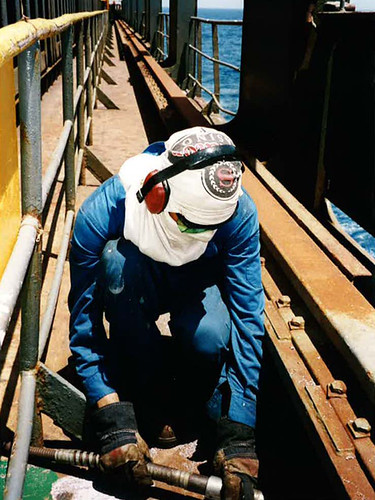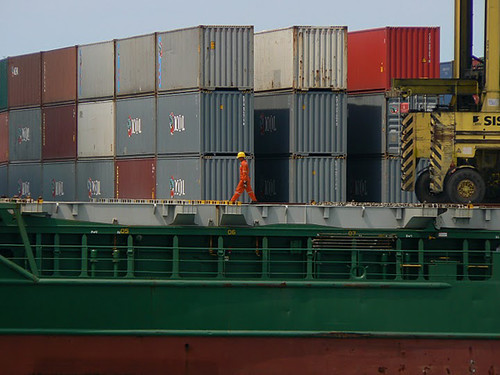By Desai Shan

Desai Shan
Desai Shan is Assistant Professor at Memorial University of Newfoundland. As a dedicated researcher in the fields of maritime law and occupational health and safety (OHS), she has published several research articles on Canadian and Chinese seafarers’ rights to occupational health and safety, including Employment-related Mobility, Regulatory Weakness, and Potential Fatigue-related Safety Concerns in Short-sea Seafaring on Canada’s Great Lakes and St Lawrence Seaway, and Workplace Death at Sea: Chinese Surviving Families’ Experiences of Compensation Claims.
Two months have passed since the publication of my first blog, People who carry food and fuel for the world are trapped at sea: a crewing crisis in the context of COVID-19. Has the crewing crisis been solved? The answer is “not yet.”
On May 5th, the International Maritime Organisation (IMO) endorsed a crew change protocol proposed by 15 industrial organizations (IMO 2020a). In this endorsement, the IMO reiterated that governments and relevant authorities are recommended to grant seafarers exemptions from national travel restrictions in order to facilitate their joining and leaving vessels (IMO 2020b). In May, only 620, or 15% of global crew changes were successful (Maritime Post 2020).
On June 7th, the shipping industry warned the crew change problem was a ticking time-bomb, as seafarers cannot be kept working indefinitely (Hollinger et al. 2020).
 On June 8th, the International Labour Organisation estimated 150,000 to 200,000 seafarers were still trapped on board ships around the world because of measures to control the COVID-19 virus spread (ILO 2020a). The International Labour Organisation urged governments, immigration, health and maritime authorities to work together and recognize seafarers as “key workers” who ensure the flow of trade and the movement of vital medical supplies, equipment, food and other critical goods during the pandemic (ILO 2020b).
On June 8th, the International Labour Organisation estimated 150,000 to 200,000 seafarers were still trapped on board ships around the world because of measures to control the COVID-19 virus spread (ILO 2020a). The International Labour Organisation urged governments, immigration, health and maritime authorities to work together and recognize seafarers as “key workers” who ensure the flow of trade and the movement of vital medical supplies, equipment, food and other critical goods during the pandemic (ILO 2020b).
By June 11th, two Filipino seafarers had committed suicide after their repatriation flights were suspended, yet again (Tomacruz 2020). The crew change crisis has turned into a humanitarian crisis.
On June 15th, the International Federation of Transport Workers (ITF) sent a message to seafarers: “Enough is enough, crew change now.” Many seafarers who have been on board for 6-10 months have had to stay on board an additional 2-3 months due to travel restrictions and a lack of flights (ITF Seafarers 2020). After the passengers were sent back home, seafarers on cruise vessels were stranded at sea for months. Depression and anxiety were reported by seafarers during the wait. In one case, the repatriation flight had been suspended four times at the time of reporting. More than 730 Chinese seafarers were stranded on Cruise vessels. A seafarer Yao Yuan said, “If I can not return home this month, I will break down” (封面新闻Fengmian Xinwen 2020).
On June 18th, Port State Control regimes[1] expressed their willingness to be part of the solution to the urgent issue of crew changes and repatriation of seafarers (IMO 2020c). Also on June 18th, the UK Maritime and Coastguard Agency (MCA) detained the cruise ship Astoria and four other vessels. About 600 Indian seafarers are now stranded on these vessels.
The UK Port State Control inspectors have found many expired Seafarers’ Employment Agreements, late payment of wages and seafarers who have been kept on board for more than 12 months (Maritime Executive 2020). Although the Port State Control inspectors could put pressure on shipowners, this would not solve the problem that many nations do not allow stranded seafarers to be repatriated by air.
Although the international governmental and non-governmental organizations keep urging governments to facilitate seafarers’ repatriation, by June 19th, only 39 states were allowing crew changes (Conard 2020). According to research done by the Baltic and International Maritime Council, by June 19th, 2020, 50 states were prohibiting crew changes.
Only a few countries such as Canada, Iceland and Ireland recognize international seafarers as  essential workers and grant seafarers exemptions from travel restrictions. Among the states that allow crew changes, quarantine conditions may apply (Conard 2020). Some countries such as China and South Africa only grant access to crew changes in their ports to their own citizens.
essential workers and grant seafarers exemptions from travel restrictions. Among the states that allow crew changes, quarantine conditions may apply (Conard 2020). Some countries such as China and South Africa only grant access to crew changes in their ports to their own citizens.
According to the International Chamber of Shipping, the top 5 countries that have most successfully achieved crew changes are the Netherlands, Germany, China, United States and Belgium. The top 5 most unsuccessful countries are Singapore, China, the United Arab Emirates, South Africa and Australia. China has the world’s largest population of seafarers, and the number of Chinese seafarer crew changes is significant. China, however, allows only crew changes for Chinese nationals, not for foreign seafarers.
Historically, seafarers have been largely invisible to most governments. Out of sight, out of mind. In the crewing crisis, with the assistance of the internet and social media, seafarers’ struggles in the pandemic are becoming more visible. International governmental and non-governmental organizations have made efforts to solve the crewing crisis. However, many sovereign states are still silent or only help their own citizens, not the citizens of other countries in their waters to complete crew changes. These countries rely, on the one hand, on maritime transport to access medical supplies, fuel, food and other essential items while, on the other hand, failing to facilitate safe and timely crew changes with proper quarantine measures.
Media coverage around the crew change crisis is also revealing inequalities among seafarers of different nations. According to a story in Le Monde, a French seafarer signed up for a 90-day service and was kept on board for 150 days. This maritime engineer described the service at sea as an ordeal and was considering giving up his future career at sea (Baudet 2020). In the same crew change crisis, a Chinese seafarer, Luo, was quoted in a story from Wangyi as saying that he usually signs an 8-10 month contract but, even before the pandemic it was common for the company to extend his service and that of others for an additional 2-3 months. Although he was stranded at sea, Luo did not dare to fight for his rights. He said: ”we are different from Filipino or Indian seafarers, who are good at defending their rights using law and regulations. We cannot. If we fight for our own rights, we will be blacklisted by shipping companies forever and we will not be able to find jobs in the industry (Insight 2020).” When asked by the journalist whether he would be able to return home on his own without company support Luo said, “a flight ticket is CNY 20,000 – 30,000 (CAD 3800 – 5762), quarantine would cost me another CNY 8000 (CAD 1500), and I would have to pay a financial penalty to the company if I left the ship” (Insight 2020).
More generally, the crewing crisis reveals the weakness of the international maritime labour governance system. Although the international governmental and non-governmental organizations continue to make efforts to develop uniform standards, the enforcement of these standards, including support for crew changes, depends on individual sovereign states. From the point of view of seafarers’ rights to health and safety, the global maritime supply chain is a ‘ticking time bomb’ that must be addressed. If more governments award seafarers ‘key worker’ status, this will be only the first step towards slowing down the timer. Expensive flights, limited flight choices and costly quarantine accommodations would also need to be removed to support seafarers’ repatriation and replacement on board in the context of this pandemic.
References:
封面新闻 (2020, June 10th) 730名中国船员滞留海上,4次计划回国 4次取消. 封面深镜. https://www.weibo.com/ttarticle/p/show?id=2309404514238927339625 (accessed June 21st 2020).
Baudet, Marie-Beatrice (2020, Juen 19th ) Les marins perdus du coronavirus. Le Monde. https://www.lemonde.fr/international/article/2020/06/19/le-coronavirus-piege-en-haute-mer_6043363_3210.html?xtor=EPR-32280629-%5ba-la-une%5d-20200620-%5bzone_edito_2_titre_4 (accessed July 1st, 2020).
CNSS (2020, June 12th). 730名中国船员滞留海上,4次计划回国 4次取消. Available at: https://s.weibo.com/weibo?q=%23%E8%87%B3%E5%B0%91730%E5%90%8D%E4%B8%AD%E5%9B%BD%E8%88%B9%E5%91%98%E4%BB%8D%E6%BB%9E%E7%95%99%E6%B5%B7%E4%B8%8A%23 (accessed June 21st, 2020).
Conard, Johan (June 19th, 2020) Covid-19 – Crew Challenges. BIMCO. Available at: https://www.bimco.org/ships-ports-and-voyage-planning/crew-support/health-and-medical-support/novel-coronavirus—crew-challenges#Singapore+ (accessed 21 June 2020a).
Insight (2020, June 22nd) 中国船员因疫情回国无门:公司侵犯利益 但不敢反抗. Available at: https://3g.163.com/news/article/FFOLJ4VK05417QGH.html?referFrom= (Accessed July 1st, 2020)
International Labour Organisation (2020a, June 8th): Release more than 150,000 seafarers trapped on board ships due to COVID-19. Available at: http://www.ilo.org/global/about-the-ilo/newsroom/news/WCMS_747293/lang–en/index.htm (Accessed June 19th, 2020).
International Labour Organisation (2020b). Information note on maritime labour issues and coronavirus. Available at: https://www.ilo.org/wcmsp5/groups/public/—ed_norm/—normes/documents/briefingnote/wcms_741024.pdf (accessed June 19th, 2020).
International Maritime Organisation (2020a) IMO endorses new protocols designed to lift barriers to crew changes. Available at: http://www.imo.org/en/MediaCentre/PressBriefings/Pages/15-crew-changes-.aspx (accessed June 21st, 2020).
International Maritime Organisation (2020b) Coronavirus (Covid-19) – Recommended Framework of Protocols. Available at: http://www.imo.org/en/MediaCentre/HotTopics/Documents/COVID%20CL%204204%20adds/Circular%20Letter%20No.4204-Add.14%20-%20Coronavirus%20(Covid-19)%20-%20Recommended%20Framework%20Of%20Protocols.pdf (accessed 21 June 2020).
International Maritime Organisation (2020c). Port State control regimes cooperate with IMO on crew changes and certificate renewals. Available at: http://www.imo.org/en/MediaCentre/WhatsNew/Pages/default.aspx (accessed June 21st 2020).
ITF Seafarers (2020, June 15th) ITF message to seafarers: Enough is enough, crew change now. Available at: https://www.itfseafarers.org/en/news/itf-message-seafarers-enough-enough-crew-change-now (accessed June 19th, 2020).
Hollinger P, Wright R and Michael P (2020, June 7th) Shipping industry warns of trade logjam as crews remain stranded. Available at: https://www.ft.com/content/4f2e33a6-e1f7-407f-b2af-8aac31e0d8ee (accessed June 19th, 2020).
The Maritime Executive (2020, June 19th) UK MCA Detains Five Cruise Ships Over Crew Welfare Concerns. Available at: https://www.maritime-executive.com/article/uk-mca-detains-cruise-ship-following-serious-crew-welfare-reports (accessed June 21st, 2020).
Maritime Post (2020, June 21st) Top 10 Countries Which Conducted Highest Crew Changes in May 2020. In: The Maritime Post. Available at: https://themaritimepost.com/2020/06/21/top-10-countries-conducted-highest-crew-change-in-may-2020/ (accessed June 22nd 2020).
Tomacruz, Sofia (2020, June 11th) Filipina cruise ship worker dies by suicide while awaiting repatriation. Rappler. Available at: https://www.rappler.com/nation/263543-filipino-seafarer-dies-by-suicide-awaiting-repatriation (accessed June 19th, 2020).
[1] Port State Control (PSC) is the inspection of foreign ships in national ports to verify that the condition of the ship and its equipment comply with the requirements of international regulations and that the ship is manned and operated in compliance with these rules
Photo Credit (in order of appearance):
International Transport Workers’ Federation. “Seafarers at work.” CC BY-NC-SA 2.0
https://www.flickr.com/photos/51532945@N00/4857174518
International Transport Workers’ Federation. “Seafarers at work.” CC BY-NC-SA 2.0
https://www.flickr.com/photos/51532945@N00/4857176318


Leave a Reply